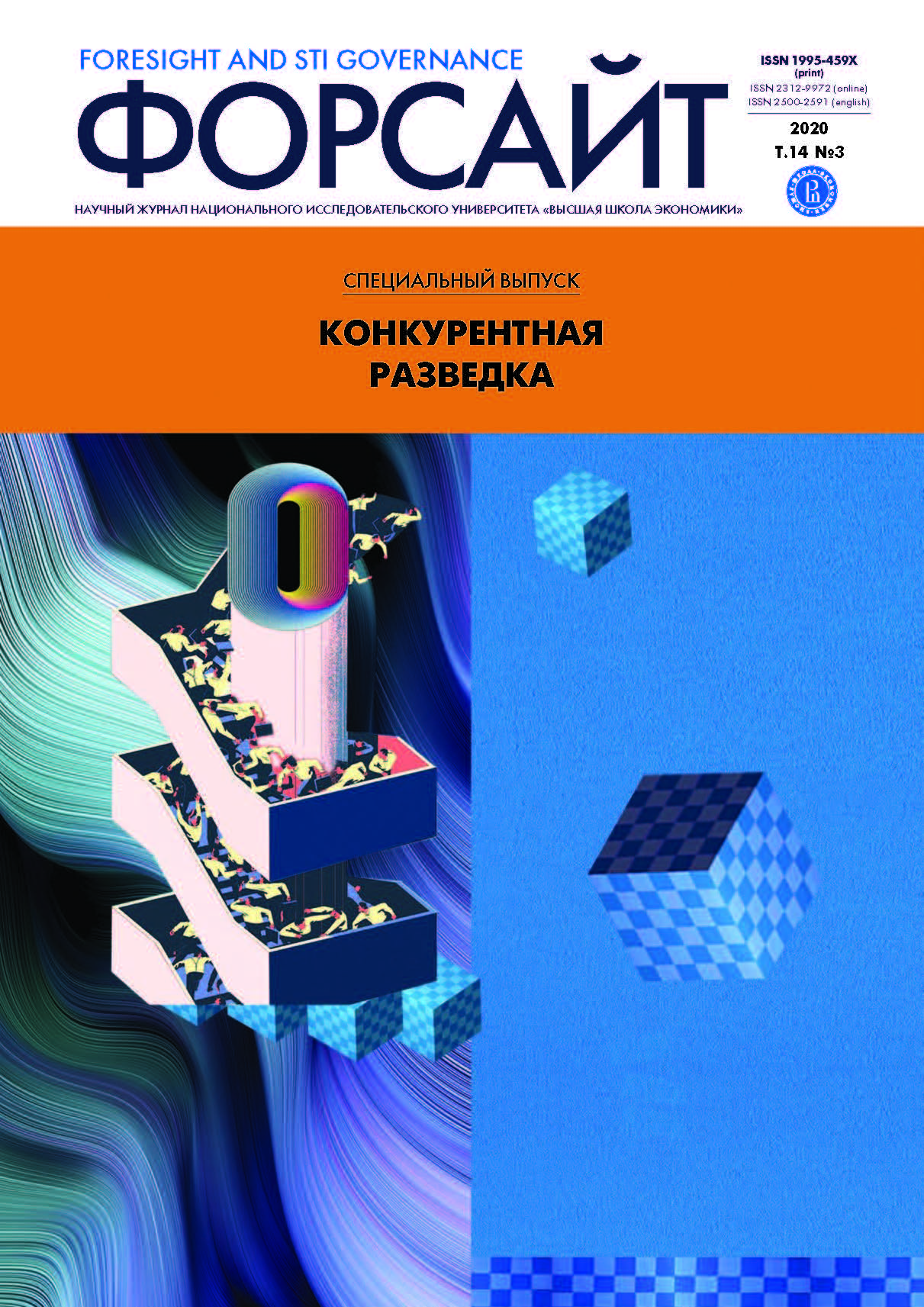Аннотация
В статье раскрывается авторская концепция бизнес-экосистемы конкурентной разведки (КР) применительно к контексту Южно-Африканской Республики (ЮАР). Статья основывается на результатах пилотного исследования бизнес-экосистемы КР за пределами Северной Америки, которые могут служить моделью применения данной концепции и связанных с ней индикаторов для других стран. Изучались практики КР в корпоративном секторе и системы ее поддержки в государственном и академическом секторах, а также со стороны профессиональных ассоциаций. Установлено, что практики КР в ЮАР динамично эволюционируют. В некоторых случаях разведка служит задачам стратегического планирования и исследования рынка. Роль определенных компонентов экосистемы, в частности академического сектора, усиливается, а других, включая деятельность ассоциаций, конференции, семинары и обучение персонала, снижается. Дальнейшие исследования позволят глубже изучить эти тенденции и их влияние на практику КР в целом.
Литература
Barnea A. (2016) Study on Competitive Intelligence in Israel // Journal of Intelligence Studies in Business. Vol. 6. № 2. P. 5-16.
Calof J.L., Arcos R., Sewdass N. (2018) Competitive intelligence practices of European firms // Technology Analysis & Strategic Management. Vol. 30. № 6. P. 658-671. Режим доступа: , дата обращения 08.02.2020. DOI: https://doi.org/10.1080/09537325.2017.1337890
Calof J.L., Brouard F. (2004) Competitive Intelligence in Canada // Journal of Competitive Intelligence and Management. Vol. 2. № 2. P. 1-21.
Calof J.L., Vibert C. (2018) Competitive intelligence in Canada // Revue Internationale d'Intelligence Economique (R2IE). Vol. 10. № 2. P. 55-67.
Crayon (2020) State of Competitive Intelligence. Режим доступа: https://www.crayon.co/state-of-competitive-intelligence, дата обращения 02.02.2020.
Dishman P.L., Calof J.L. (2008) Competitive intelligence: A multiphasic precedent to marketing strategy // European Journal of Marketing. Vol. 42. № 7/8. P. 766-785.
Drieman J. (2018) Global Intelligence Survey 2017 Highlights // Competitive Intelligence. Vol. 21. № 2. P. 52-60.
Du Toit A.S.A. (2015) Using environmental scanning to collect strategic information: A South African survey // International Journal of Information Management. Vol. 36. № 1. P. 16-24. Режим доступа: , дата обращения 08.02.2020. DOI: https://doi.org/10.1016/j.ijinfomgt
Du Toit A.S.A., Sewdass, N. (2014) Competitive intelligence in Morocco // African Journal of Library, Archives and Information Science. Vol. 24. № 1. P. 3-13.
Fehringer D., Hohhof B., Johnson T. (eds.) (2006) State of the art competitive intelligence. Competitive Intelligence Foundation Research Report. Alexandria, VA: Society of Competitive Intelligence Professionals.
GCIS (2019) South Africa Yearbook 2018/9. Government Communication and Information System (GCIS). Режим доступа: https://www.gcis.gov.za/south-africa-yearbook-2018/19, дата обращения 10.02.2020.
Garcia-Alsina M., Cobarsi-Morales J., Ortoll E. (2016) Competitive intelligence theoretical framework and practices // Aslib Journal of Information Management. Vol. 68. № 1. P. 57-75. Режим доступа: , дата обращения 25.02.2020. DOI: https://doi.org/10.1108/AJIM-04-2015-0061
Glitman E. (2010) SCIP 2010 Conference Award Recipients // SCIP Insight. Vol. 3. № 3. P. 1-4.
Hayes A. (2019) Business Ecosystem. Режим доступа: https://www.investopedia.com/terms/b/business-ecosystem.asp, дата обращения 10.03.2020.
Hult G.T.M., Gonzalez-Perez M.A., Lagerstrom K. (2020) The theoretical evolution and use of the Uppsala Model of internationalization in the international business ecosystem // Journal of International Business Studies. Vol. 51. P. 38-49. Режим доступа: , дата обращения 02.04.2020. DOI: https://doi.org/10.1057/s41267-019-00293-x
Mirum (2020) The SCIP definition of Competitive Intelligence. Режим доступа: http://competitive-intelligence.mirum.net/, дата обращения 30.03.2020.
Moore J. (1993) Predators and Prey: A New Ecology of Competition // Harvard Business Review. May/June 1993. Режим доступа: https://hbr.org/1993/05/predators-and-prey-a-new-ecology-of-competition, дата обращения 11.05.2020.
Muller M.-L. (1999) SA: An emerging CI Player // Competitive lntelligence Review. Vol. 10. № 4. P. 74-78.
Muller M.-L., Viviers W. (2004) The Evolution of Competitive Intelligence in South Africa: Early 1980s?2003 // Journal of Competitive Intelligence and Management. Vol. 2. № 2. P. 53-67.
Munoz-Canavate A., Alves-Albero P. (2017) Competitive intelligence in Spain: A study of a sample of firms // Business Information Review. Vol. 34. № 4. P. 194-204. Режим доступа: , дата обращения 25.02.2020. DOI: https://doi.org/10.1177/0266382117735982
Nasri W. (2011) Competitive intelligence in Tunisian companies // Journal of Enterprise Information Management. Vol. 24, no. 1. P. 53-67. Режим доступа: , дата обращения 25.02.2020. DOI: https://doi.org/10.1108/17410391111097429
Nenzhelele T.E. (2016) Competitive intelligence practice in the South African property sector // South African Journal of Information Management. Vol. 18. № 2. Art. 711. P. 1-11.
Pellissier R., Nenzhelele T.E. (2013) Towards a universal competitive intelligence process model // South African Journal of Information Management. Vol. 15. № 2. Art. 567. Режим доступа: https://sajim.co.za/index.php/sajim/article/view/567/657, дата обращения 03.02.2020.
Sewdass N., Du Toit A.S.A. (2014) Current state of competitive intelligence in South Africa // International Journal of Information Management. Vol. 34. № 2. P.185-190.
Sewdass N., Du Toit A.S.A. (2015) Competitive Intelligence in emerging economies: A comparative study between Brazil and South Africa // TD The Journal of Transdisciplinary Research in Southern Africa. Vol. 11. № 1. P. 113-132.
Strauss A.C., Du Toit A.S.A. (2010) Competitive intelligence skills needed in South Africa // Aslib Proceedings. Vol. 62. № 3. P. 302-320.
Viviers W., Saayman A., Muller M.-L. (2004) Competitive intelligence in South Africa: 1999?2002 and beyond //Africa Insight. Vol. 34. № 2/3. P. 90-96.
Viviers W., Saayman A., Muller M.-L., Calof J. (2002) Competitive intelligence practices: A South African study // South African Journal of Business Management. Vol. 33. № 3. P. 27-37.

Это произведение доступно по лицензии Creative Commons «Attribution» («Атрибуция») 4.0 Всемирная.

